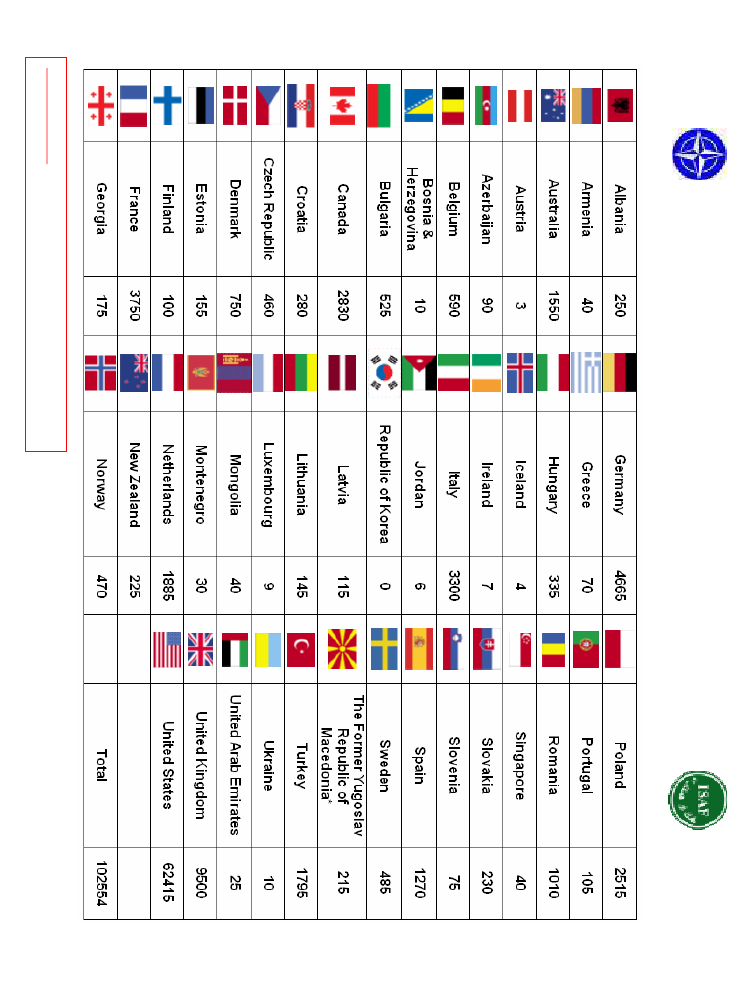OSCEs parlamentariske Forsamling 2009-10
OSCE Alm.del Bilag 55
Offentligt
Follow‐UponRecommendationsintheVilniusDeclaration
AnnualSession2010FirstGeneralCommitteeonPoliticalAffairsandSecurity
PreparedbytheInternationalSecretariatfortheVice‐ChairoftheCommittee,Ms.CananKalsin
FirstCommitteeFollow‐UpReport2010
ContentsIntroduction ..................................................................................................................................... 2The Food Crisis and Security in the OSCE Area ............................................................................ 3Strengthening the OSCE ................................................................................................................. 7Afghanistan ................................................................................................................................... 11Small Arms and Light Weapons ................................................................................................... 19Renewed Discussion on Arms Control and Disarmament in Europe ........................................... 24Labour Migration in Central Asia ................................................................................................. 29Security Sector Stabilization and Compliance with UN Blacklists .............................................. 31ANNEX ………………………………………………………………………………………... 33
Note on sources: In September 2009, the International Secretariat circulated a questionnaire toOSCE PA Delegations, asking for information on the implementation of OSCE PArecommendations. Unless otherwise referenced, information in this report can be found in theresponses provided by parliaments, which are available from the OSCE PA InternationalSecretariat. The International Secretariat wishes to thank the Delegations that provided answers,as well as the OSCE Secretary General for information provided on behalf of the OSCE.1
FirstCommitteeFollow‐UpReport2010
First General Committee on Political Affairs and Security:Resolutions and Recommendations
IntroductionParliamentarians representing 50 OSCE participating States met in Vilnius from 29 June to 3July 2009 to assess developments and challenges relating to security and co-operation, focusingon the general theme ofThe OSCE: Addressing New Security Challenges.In particular, theGeneral Committee on Political Affairs and Security (First Committee) passed resolutionsregarding strengthening the OSCE, small arms and light weapons, arms control anddisarmament, labour migration, and Afghanistan.This report considers actions taken by the OSCE and its participating States in relation to theOSCE PA’s recommendations. With the strong support of parliamentary delegations and theOSCE governmental side, the report is intended to provide a general overview of relevantdevelopments by participating States and the OSCE.While the majority of the recommendations addressed here are found in the OSCE PA’s VilniusDeclaration of July 2009, key themes from past Declarations have also been considered, toensure greater continuity and scope. The International Secretariat would like to thank thedelegations that responded to the OSCE PA International Secretariat’s Questionnaire for theirsupport; the information provided by these answers have been an invaluable source in ourresearch. Responses from delegations are available from the International Secretariat, and PAmembers are encouraged to examine this valuable source of information, in the interests ofcontinuing exchanges of best practice.
2
FirstCommitteeFollow‐UpReport2010
The Food Crisis and Security in the OSCE AreaI.Vilnius Declaration, Chapter I
Recognizing that the food crisis is a major challenge for the OSCE area, the OSCE ParliamentaryAssembly passed a resolution emphasizing that food security must become a top priority on theOSCE agenda. The resolution urges parliaments to adopt food security laws and policies in orderto prevent hunger and malnutrition as well as legislation to encourage balanced agricultural useof land to meet both food and energy demands. On the international level, the resolutionrecommends that States take a co-ordinated and consistent approach and it encouragesparticipation in the World Summit on Food Security (WSFS) organized by the Food andAgriculture Organization of the United Nations (FAO) in Rome in November 2009.
II.
OSCE Initiatives
Kazakh Chairmanship’s PrioritiesUpon Kazakhstan’s assumption of the Chairmanship of the OSCE on 14 January 2010, PresidentNursultan Nazarbayev stressed that famine is a challenge that calls for maximum efforts bymultilateral institutions like the OSCE. He also emphasized that Kazakhstan, as a major exporterof grain and other foodstuffs, is actively promoting the implementation of the United NationsMillennium Development Goals in order to end hunger and ensure food security.1Addressing the OSCE Chairmanship Conference on Security Implications of Climate Change inthe OSCE Region, which took place in Bucharest on 5-6 October 2009, Mukhtar Tultabayev,Deputy Director of Environmental Policies and Sustainable Development at the Ministry ofEnvironmental Protection of the Republic of Kazakhstan, stated that Astana had recently begunto implement a system designed to ensure crops against adverse weather conditions and fires.217thOSCE Ministerial CouncilIn his address to the 17thOSCE Ministerial Council on 1-2 December 2009 in Athens, theMinister of Foreign Affairs of the Republic of Tajikistan Hamrokhon Zarifi called upon theOSCE to have more active participation and elaborate mechanisms of early warning pendingpossible conflict scenarios. He declared that Tajikistan, which is one of the most food insecure
Text of the video address by President Nursultan Nazarbayev on the occasion of Kazakhstan’s assumption of theChairmanship of the OSCE, 14 January 2010, CIO.GAL/4/10.2Statement by Mr. Mukhtar Tultabayev, Deputy Director of environmental policies and sustainable development atthe Ministry of Environmental Protection of the Republic of Kazakhstan, at the OSCE Chairmanship Conference onSecurity Implications of Climate Change in the OSCE Region, Bucharest, Romania on 5-6 October 2009.
1
3
FirstCommitteeFollow‐UpReport2010
nations in the OSCE area,3supports the equal and fair right for all to food independence as anindispensable condition of the maintenance of stability, security and well-being.4Representing an OSCE partner State in the 17thOSCE Ministerial Council, the Head of theDelegation of Thailand, Nongnuth Phetcharatana, declared that the ASEAN community willwork to ensure food and energy security. She added that food security has been dealt with underthe East Asia Rice Reserve, which will ensure the stability of food prices as well as guaranteesupplies in the incident of global food shortages.5Food security in the OSCE Programme 2010The 2010 OSCE Programme Outline indicates that food security is a top priority of the Office forEconomic and Environmental Affairs (EEA) of the OSCE Office in Tajikistan and the ProjectCo-ordinator in Uzbekistan (PCUz).The EEA of the OSCE Office in Tajikistan supports the Government in implementing economicreforms, while continuing to support the efforts of civil society to promote the development ofsmall and agricultural businesses, and attract returning migrants to the idea of investing theirearnings in starting small businesses. Because Tajikistan remains a largely agrarian society, thefocus in 2010 will be on assisting the process of integration of Small Business and AgriculturalResource Centres (SBRAC) into the public service sector though public-private partnerships.6According to the 2010 OSCE Programme outline, the Project Co-ordinator in Uzbekistan willcontinue to combat land degradation and will also focus on rural areas by directing its resourcesto the improvement of agriculture and the diversification of rural economies.7
III. World Summit on Food SecurityForty-two OSCE participating States took part in the World Summit on Food Security (WSFS)organized by the FAO in Rome on 16-18 November 2009. The States adopted a Declaration ofthe WSFS in which they agree to conduct their actions in accordance with five principles forsustainable global food security. According to these principles, governments will invest incountry-owned plans aimed at channeling resources to well-designed and results-basedprogrammes and partnerships. They will also foster strategic co-ordination at national, regionaland global levels to improve governance, promote better allocation of resources, avoidduplication of efforts and identify response gaps. States will strive for a comprehensive twin-World Food Programme Tajikistan: Overview, http://www.wfp.org/countries/TajikistanAddress by H.E Minister of Foreign Affairs of the Republic of Tajikistan Mr. Hamrokhon Zarifi at the 17th OSCEMinisterial Council Meeting, Athens, 1-2 December 2009,http://www.osce.org/documents/cio/2009/12/41684_en.pdf.5Statement by H.E. Mrs. Nongnuth Phetcharatana, Ambassador and Permanent Representative of Thailand to theUnited Nations in Vienna Head of the Delegation of Thailand to the 17th OSCE Ministerial Council 2 December2009, Athens, Greece,http://www.osce.org/documents/cio/2009/12/41822_en.pdf.62010 OSCE Programme Outline, Office in Tajikistan, p.123.72010 OSCE Programme Outline, Project Co-ordinator in Uzbekistan, p. 120.43
4
FirstCommitteeFollow‐UpReport2010
track approach for food security which consists of direct action as well as medium and long termprogrammes for sustainable agriculture and food security. Finally, they will ensure a strong rolefor the multilateral system as well as sustained and substantial commitment by all partners toinvestment in agriculture and food security.8On the occasion of the WSFS, the Parliamentary Assembly’s First Committee RapporteurRiccardo Migliori addressed a special Parliamentary Meeting organized by the Italian Parliamentand the Inter-Parliamentary Union on 13 November 2009. In his speech, Mr. Migliori informedparticipants of the OSCE PA’s resolution on food security adopted at the 18thAnnual Session.“We are robustly demanding that our governments provide the necessary resources to achievethe ambitious Millennium Development Goals by 2015 as well as adopting urgent and securepolicy measures,” Mr. Migliori said. “Measures can be adopted to halt agricultural priceincreases in order to foster the balanced use of suitable farmlands, promote a worldwide networkof agricultural scientists, and adopt an international recovery strategy to be able to farmenormous expanses of step lands,” he said.9IV.National Initiatives / Best Practices
The United Nations’ World Food Programme recently praised the Russian Federation for an“innovative” school meals projects run by the Russian Government that will serve as the modelfor new WFP-co-ordinated programmes in Armenia, Kyrgyzstan and Tajikistan. The projects inthe town of Yaroslavl, 250 km northeast of Moscow, have been designed to promotesustainability and building links with local agriculture.10In Poland, municipalities are responsible for providing food assistance to the poorest individuals.They receive significant financial support from the Ministry of Labour and Social Policy througha long-term programme called State Food Assistance. According to “Poland’s Energy Policyuntil 2030” energy needs will be primarily catered through the use of agricultural and agri-foodindustry byproducts and residues. Adhering to national and EU objectives relating to food andbio-energy production, the Ministry of Agriculture and Rural Development considers appropriateto support new farm biofuel projects, and the development of energy crops on fallow land.In addition, the Agency for Restructuring and Modernization of Agriculture provides loans forthe purchase of farmland to persons under 40 years old. It strives to implement farm settlementprogramme on land owned by the State Treasury; implement investment projects in agriculture,agri-food processing and agricultural services; provide financial assistance to agriculturalproducers; and create new jobs for the rural population.Support under the Rural Areas Development Programme 2007-2013 (PROW), partly financed bythe EU, includes start up assistance; structural pension; financial support for high-quality foodWorld Summit on Food Security, Declaration of the World Summit on Food Security, Rome, 16-18 November2009,http://www.fao.org/fileadmin/templates/wsfs/Summit/Docs/Final_Declaration/WSFS09_Declaration.pdf.9OSCE PA website, “Riccardo Migliori speaks on food security at FAO event”,http://www.oscepa.org/index.php?view=article&id=745%3Ariccardo-migliori-spoke-on-food-security&option=com_content&Itemid=73security&option=com_content&Itemid=73.10United Nations World Food Programme News, “Russia Provides Model for School Meals in CIS,” 18 March2010,http://www.wfp.org/stories/russia-provides-model-school-meals-cis8
5
FirstCommitteeFollow‐UpReport2010
production; assistance to agricultural producer groups; support farming in mountainous areas andless favoured areas (LFA); the modernization of farms and utilities in rural areas; farmer non-agricultural business activities, construction or repair of cultural and recreational facilities,restoration of monuments, cultural and recreational facilities and formation of micro-businesses.In Liechtenstein the balanced use of agricultural land is ensured by means of the AgriculturalLaw of 2008 which aims to promote environmentally friendly and animal friendly agriculture. Inorder to maintain soil fertility, the environmental impact is minimized by environmentallyfriendly forms of production, such as integrated production and organic farming. In parallel withSwitzerland, the Ecological Performance Certificate was introduced for environmentally friendlyand animal-friendly cultivation. The use of agricultural aids (fertilizers, pesticides) is strictlyregulated.In order to ensure food security Monaco supports the Emergency Humanitarian Aid of the WorldFood Programme. Monaco contributed 100,000 EUR to the World Food Programme last year,especially to cope with the food crisis in Niger and Madagascar.The Belgian Fund for Food Security, with a budget of 250 million EUR, focuses on helpingchronically insecure areas meet their food needs. The Chamber of Representatives adopted on 19March 2009 a resolution related to a new general policy to fight against hunger in the context ofthe current world food crisis.Norway allocated 24.6 million EUR as humanitarian aid to areas affected by drought and hungerin 2009, mostly to countries on the Horn of Africa. Also that year, the Government provided 38million EUR to the Emergency Relief Fund of the United Nations. After having addressed theWhite Paper on Climate, Conflict and Capital in May 2009 the Parliament gave its support theGovernment's initiative to increase foreign aid related to agriculture in developing countries.France has proposed a global partnership on agriculture and food security since 2008. In April ofthat year, the Government set up a high level inter-ministerial working group on food security indeveloping countries in an attempt to find short-term, medium-term and long-term solutions tothe food crisis. In July 2009 France signed the Aquila Declaration on food security and pledged16.4 billion EUR. France also signed the G20 Pittsburgh Declaration on 25 September 2009 andtook part in the World Summit on Food Security held in Rome in November 2009.France participated in efforts reform the FAO Food Security Committee with the view ofpromoting policy convergence and a common global strategic framework. Within thisframework, it supports the creation of the High Level Panel of Experts (HLPE) and provides150,000 EUR for its maintenance. The aim is for the HLPE to tackle climate change, pricefluctuation, and tax issues. France committed to provide 1.5 billion EUR for the period 2009-2011 for food security within the framework of its aid development programme and hosts thegroup. At the national level, a draft law on agriculture and fishing modernization has beenpresented to Parliament.The United Kingdom launched a new strategy entitled “Food 2030” in January 2010. Thestrategy aims to develop a sustainable food system. It emphasizes education of consumers,6
FirstCommitteeFollow‐UpReport2010
producers, processors and retailers on food sustainability, and includes requirements for the foodsystem to be low-carbon based and efficient with resources. In order to develop and implementthis strategy, the UK Government continues to work with food sector stakeholders. Progress willbe monitored using a variety of indicators. The UK is pursuing effective delivery of thecommitments made at the WSFS, including the further development of the Global Partnershipfor Agriculture and Food Security.The Department for Environment, Food and Rural Affairs and the Department for InternationalDevelopment are co-sponsoring the Foresight Global Food and Farming Futures Project to lookat how a projected global population of nine billion in 2050 can all be fed sustainably andhealthily. The findings are due to be launched in November 2010.Switzerland supported the work of the UN Secretary General’s High-Level Task Force on theGlobal Food Security Crisis and actively participated in the reform FAO Committee on WorldFood Security and played a significant role in restructuring the Consultative Group onInternational Agriculture Research.Iceland’s policy on development co-operation is based on the Millennium Development Goalsand other internationally agreed development objectives. The main focus areas are sustainabledevelopment, poverty reduction, capacity building, gender equality, and advancement ofdemocracy. Multilateral development co-operation is mostly channelled through United NationsFunds and Programmes, such as UNICEF, UNIFEM, UNFPA, UNHCR, UNDP and UNU, aswell as the World Bank.Slovenia has set food security, food sustainability and permanent preservation of agriculturalland’s soil fertility as mid-term goals in the Slovenian Agriculture Development Strategy. Thesegoals are also mentioned in the Agriculture Act in addition to agriculture and rural developmentplanning, agricultural policy measures.
Strengthening the OSCEI.Vilnius Declaration, Resolution on Strengthening the OSCE
Recalling previous recommendations by the OSCE Parliamentary Assembly regarding the needfor institutional reform in the OSCE – specifically the resolutions adopted in St. Petersburg(1999), Paris (2001), Edinburgh (2004), Kyiv (2007) and Astana (2008) – the VilniusDeclaration again called for comprehensive reform of the Organization. In particular, theDeclaration emphasized the need for the Permanent Council to open its meetings to the press andthe public, and for the OSCE to modify the consensus rule for decision-making. The PA alsocalled on the Permanent Council “to recognise its accountability to the citizens of the OSCEparticipating States and their elected representatives through timely responses and reaction toOSCE PA recommendations.”
7
FirstCommitteeFollow‐UpReport2010
The resolution further calls for the OSCE PA “to be given an oversight role in relation to theOSCE budget and for confirmation by the Assembly of the OSCE Secretary General, oncenominated, as called for in the 2005 Colloquium Report on the Future of the OSCE.” In addition,the Declaration “urges the engagement of independent, external professional auditors to overseethe disbursement and expenditure of all funds within the OSCE, to report directly to the OSCEChairmanship Troika and the President of the OSCE Parliamentary Assembly, and to make theirfindings, observations, conclusions and recommendations available to participating States andthe Parliamentary Assembly.”
II.
Continued Advocacy for Reform by the OSCE PA
Since the passage of the “Strengthening the OSCE” resolution, OSCE PA President Joao Soareshas continued to push for institutional reform in the Organization. Addressing the PermanentCouncil in November, the President said that it “is not in line with the spirit of Helsinki that thePermanent Council conducts its work largely in private, behind closed doors. This democraticdeficit remains to be addressed. ... PC meetings need to open up and allow for the presence of thepress and the interested public, particularly when it comes to the debates under Current Issues.”11Mr. Soares also reminded the Permanent Council that the Parliamentary Assembly continues tobe a very strong supporter of the OSCE’s field missions. “These missions,” he said, “representthe core of the OSCE’s current work, and they must be maintained and indeed strengthened. Ihave visited almost all missions – ten of them this year, and I can personally attest to theexcellent work that the hard-working, dedicated individuals in these missions do under oftendifficult circumstances.”12At the Athens Ministerial Council in December, President Soares again pressed for reform inorder to increase the legitimacy and political relevance of the OSCE, expressing his hope that“theOSCE can be reinvigorated through a genuine review process at the highest political level.”Thedecision-making structures in Vienna “are virtually unable to reach agreement, particularly onkey political issues,” Mr. Soares said, and “for many years now the Permanent Council hasproved unable to come to a single decision that in any substantive way improves upon theexisting commitments that we already have.”13Important to the OSCE’s revival would be, according to Mr. Soares, holding an OSCE Summitin 2010, as proposed by Kazakhstan. Such a Summit would be a reminder to our citizens of the“important contribution of the Helsinki Final Act and the Charter of Paris,” he stated.14
“Address by OSCE Parliamentary Assembly President João Soares,” Permanent Council, Vienna, 19 November2009, http://www.oscepa.org/images/stories/documents/presidential_speeches/2009-Soares-Speech-Permanent-Council-Vienna-191109.pdf12Ibid.13Opening speech by OSCE Parliamentary Assembly President Joao Soares at the 17th OSCE Ministerial Councilin Athens, 1 December 2009, http://www.oscepa.org/images/stories/documents/presidential_speeches/2009-Soares-Speech-Ministerial-Council-Athens.pdf14Ibid.
11
8
FirstCommitteeFollow‐UpReport2010
In April 2010, President Soares extended the mandate of and appointed new leadership to theOSCE PA’s Ad Hoc Committee on Transparency and Accountability. Established in 2001, theAd Hoc Committee was tasked with putting forward recommendations on how to improve thework of the OSCE and to increase its transparency. Its new mandate includes providing input tothe OSCE Corfu Process, launched in June 2009 at an informal meeting of OSCE foreignministers. Other key priorities of the Committee include changing the use of the secret singlecountry veto in the decision-making procedure of the OSCE, to improve the level of feedbackfrom the Governmental side on the Assembly’s recommendations and Declarations, and toestablish regular contacts between the leadership of the OSCE and its Parliamentary Assembly.15The Deputy Speaker of the Finnish Parliament, Johannes Koskinen, has agreed to chair theCommittee, which is made up of senior members of the Assembly from 14 differentcountries. They are: Adil Akhmetov, Kazakhstan; Vilija Abramikiene, Lithuania; DorisBarnett, Germany; Petur Blondal, Iceland; Pia Christmas-Moeller, Denmark; Xavier De Donnea,Belgium; Consiglio Di Nino, Canada; Petros Efthymiou, Greece; Suzana Grubjesic, Serbia;Aleksander Kozlovskiy, Russia; Goran Lennmarker, Sweden; Tony Lloyd, UK; RiccardoMigliori, Italy; and Pawel Poncyljusz, Poland.III. The 2005 Report of the Washington Colloquium16and OSCE Institutional ReformThe Report of the Washington Colloquium is a key document providing importantrecommendations on how to reform the OSCE. In many of its resolutions, the PA has urged thePermanent Council to put the report on its agenda and to debate its recommendations. On severaloccasions the report, which at the time had been presented to the OSCE Ambassadors by PASecretary General Spencer Oliver, has been circulated among the participating States’ permanentmissions in Vienna.The Vienna Liaison Office recently distributed a contribution to the ongoing Corfu Processcontaining all major recommendations from the report and putting them in the context of thecurrent discussions.17The Kazakh Chairmanship referred to the report in the documentary putbefore the OSCE Ambassadors during their last “Corfu Retreat” on 15 May 2010.Several permanent missions, among them Canada, Germany, Greece, Romania and Switzerland,as well as the EU, have advocated an inclusion of the recommendations in the debates. However,a discussion on the substance of the OSCE PA recommendations has yet to take place. Although
OSCE PA Press Release: “New leadership, expanded mandate for Transparency Committee,” 29 April 2010,http://www.oscepa.org/index.php?view=article&id=847%3Anew-leadership-expanded-mandate-for-transparency-committee&option=com_content&Itemid=7316The Colloquium on “The Future of the OSCE” was a joint project of the OSCE Parliamentary Assembly and theSwiss Institute for World Affairs held in Washington D.C. on 5-6 June 2005 and included diplomats, politicians, andexperts with great experience and knowledge of the OSCE. This Report has been agreed by President of the OSCEPA, Congressman Alcee L. Hastings and the Swiss Foundation Chairman, Ambassador Edouard Brunner,http://www.oscepa.org/images/stories/documents/special_reports/report_on_the_colloquium_on_the_future_of_the_osce.pdf17“Food-for-Thought contribution to the ongoing Corfu discussions” distributed on 7 May 2010 under referencePA.GAL/1/10
15
9
FirstCommitteeFollow‐UpReport2010
discussion has taken place in the Permanent Council on the consensus rule in decision-makingthis has not been part of ageneralreview of OSCE PA recommendations.Despite the calls of the OSCE PA, the meetings of the Permanent Council remain closed to thepublic, and no changes have been made to the decision-making process in Vienna. Although theissue of institutional reform remains high on the agenda of those in leadership positions in theOSCE, the Parliamentary Assembly still has no official role in approving the OSCE budget or inconfirming the OSCE Secretary General.
IV. OSCE Secretary General’s ResponseIn response to PA’s request to review of the failure of the Organization to effectively implementthe 2004 Action Plan for the Promotion of Gender Equality, OSCE Secretary General MarcPerrin de Brichambaut drew attention to the differentiated review which he publishes in hisAnnual Report on the Gender Action Plan.According to Ambassador de Brichambaut, “the Organization continues to strive toward agreater gender balance in higher management positions (P5 and above).” The Secretary Generalemphasized “the appointment within the past year of three female P5 managers in the Office ofthe Secretary General.” In addition, the Secretariat has issued a policy against sexual harassmentand discrimination, as well as recommendations to promote a gender-sensitive workingenvironment.Regarding the PA’s emphasis on the need for timely adoption of the OSCE budget, the SecretaryGeneral responded that it is “entirely the responsibility of participating States. For the first timein several years, the Unified Budget for 2010 was adopted prior to the start of the budget year(22 December 2009)”. Regarding the need for updating the OSCE Financial regulations, theSecretary General reported that “the participating States through their Advisory Committee onManagement and Finance (ACMF) structure remain deadlocked on agreeing updated financialregulations.”In response to PA’s recommendation that reliance on secondments for staffing OSCE fieldoperations be reduced and that transparency be enhanced regarding the recruitment process, theSecretary General reported that he had made a focused appeal to the participating States. Thedocument “Preserving the Effectiveness of the Secondment System” (SEC.GAL/27/09/Corr.1 of2 March 2009) has served as a basis for discussions on the renewed commitment to thesecondment system. In the Budget proposal for the year 2010, “conversions of secondedpositions to contracted ones were limited, mainly due to financial implications. A gradual andwell-planned process of adapting and strengthening the Programmes’ staff components may becontinued further but will remain directly linked to the availability of resources.”Regarding the PA’s recommendation that OSCE professional staff term limits be eliminated inorder to attract and keep highly qualified professional staff, “the Secretary General twice in 2009has proposed to the participating States to consider measures” going in this direction.
10
V.
FirstCommitteeFollow‐UpReport2010
National Initiatives / Best Practices
In the management area, the United Kingdom is working with the OSCE Secretariat and OSCEparticipating States to try to achieve more merit-based appointments; more effective staffassessment procedures; improved recruitment procedures so as to increase staff's strategic,programme and people management skills; greater transferability between the OSCE Secretariat,Institutions and Field Missions; a results-based budget which is more focused on areas of OSCEcomparative advantage; and improved gender balance, particularly at senior levels and in theField Missions.Poland also supports efforts aimed at simplifying staff regulations and recruitment mechanisms,first of all for field missions. Sweden’s Ministry of Foreign Affairs and representation at OSCEin Vienna maintains an ongoing exchange of information with the Riksdag OSCE delegation.The Republic of Slovenia has raised concerns over the financing of voluntary contributions,calling for improved methods regarding the use of voluntary funds. In this field, Sloveniasupports the efforts and initiatives of the OSCE Parliamentary Assembly. Andorra’s Minister ofForeign Affairs supports the improvement of OSCE mechanisms and instruments in theframework of the Corfu Process.
AfghanistanI.Vilnius Declaration, Resolution on Afghanistan
Regarding Afghanistan, the Vilnius Declaration pledges that the OSCE Parliamentary Assembly“will promote Afghanistan’s increasing participation in the activities of the OSCE,” and calls on“the Government of Afghanistan, the United Nations Assistance Mission in Afghanistan and theOSCE to redouble efforts to promote the role of women and equal opportunities for women inAfghan society.” It expresses support to the OSCE’s efforts in assisting Afghanistan with bordermanagement training and calls on Afghanistan to ensure free and fair elections. The Resolutionalso calls for greater co-operation between OSCE and Pakistan as a possible Partner for Co-operation to boost security in the OSCE regionII.Afghan Security Situation
With 520 coalition casualties and 2,412 civilians killed, 2009 was the deadliest year inAfghanistan since military operations began in 2001.18Most of the civilian deaths, according tothe UN’s Assistance Mission in Afghanistan, were the result of Taliban attacks and in January2010 the UN reminded all sides of Afghanistan’s conflict of their obligations under internationallaw to minimize the impact of fighting on civilians.192010 has continued to see high casualties;
1819
iCasualties.org – Operation Enduring Freedom, http://www.icasualties.org/OEF/Index.aspx“UNAMA calls for safety first, as civilian casualties rise by 14% in 2009,” United Nations Assistance inAfghanistan, 13 January 2010,http://unama.unmissions.org/Default.aspx?tabid=1741&ctl=Details&mid=1882&ItemID=7260
11
FirstCommitteeFollow‐UpReport2010
however, the number of civilian deaths has been lower than in the same period in 2009,according to two Afghan human rights groups.20In response to the deteriorating security situation, at the December 2009 NATO Ministerial, 25NATO countries pledged to commit 7,000 additional soldiers, with more to follow. In addition,the United States pledged an extra 30,000. NATO Secretary General Anders Fogh Rasmussenannounced that the NATO countries had also agreed on “a new roadmap for this mission” with“substantially more aid money” and “a new policy to support actively the reintegration ofTaliban fighters who lay down their arms.”21III.Presidential and Provincial Council Elections
The 20 August 2009 presidential and Provincial Council elections in Afghanistan were markedby allegations of ballot stuffing, intimidation, and other electoral fraud. “The lack of effectivemeasures to prevent irregularities, widespread fraud on election day, and the failure of theAfghan-formed Independent Election Commission (IEC) to respond resolutely and efficiently tomalpractices, resulted in a deep lack of confidence in the process,” the OSCE/ODIHR ElectionSupport Team reported.22The Afghan Electoral Complaints Commission found “clear and convincing evidence of fraud”23at 83 polling stations and ordered that ballots be invalidated, with election stakeholders accusingthe IEC of doing too little to prevent the abuses. An investigation conducted by the BBC foundevidence of voting cards being offered for sale and bribes being offered to buy votes.24Citingthese “serious deficiencies,” the OSCE/ODIHR questioned “the appropriateness and usefulnessof holding elections under the dramatically challenging circumstances prevailing in Afghanistanin August 2009.”25A second round of voting that was scheduled for 7 November 2009 was scuttled after oppositioncandidate Abdullah Abdullah announced that he would not be participating in the run-offbecause his demands for changes in the electoral commission had not been met. On 2 November,officials of the election commission cancelled the run-off and declared Hamid Karzai Presidentof Afghanistan for another five year term.26
IRIN: ‘Afghanistan: Dip in civilian deaths in first two months of 2010’, 1 March 2010,www.irinnews.org/Report.aspx?ReportId=88268,(accessed 27 May 2010)21“Press Conference with NATO Secretary General Anders Fogh Rasmussen after the NATO Foreign Ministersmeeting with non-NATO ISAF Contributing Nations,” 4 December 2009,http://www.nato.int/cps/en/natolive/opinions_59872.htm22“Islamic Republic of Afghanistan – Presidential and Provincial Council Elections, 20 August 2009,”OSCE/ODIHR Election Support Team Final Report, 8 December 200923“Afghan vote commission orders first ballots invalidated,” AFP, 10 September 2009,http://www.google.com/hostednews/afp/article/ALeqM5i3xqZSi2U_mgENDm3TK0-yqI7I_g24“Afghan election fraud is unearthed,” BBC News, 18 August 2009,http://news.bbc.co.uk/2/hi/8207315.stm25“Islamic Republic of Afghanistan – Presidential and Provincial Council Elections, 20 August 2009,”OSCE/ODIHR Election Support Team Final Report, 8 December 200926“Out of Race, Karzai Rival Is Harsh Critic of Election,” New York Times, 1 November 2009,http://www.nytimes.com/2009/11/02/world/asia/02afghan.html
20
12
FirstCommitteeFollow‐UpReport2010
Afghanistan has parliamentary elections scheduled this year, and if the Government decides toproceed,27ODIHR has called for a “pro-active and comprehensive approach to fraud preventionand investigation.” Specifically, Afghanistan needs to strengthen the independence, impartiality,transparency, accountability and credibility of election administration, and especially of the IEC.Also, Afghanistan must transform the Electoral Complaints Commission into a permanent bodyand develop the organizational capacities of domestic observer groups.28Considering the extentof the reform that is necessary, ODIHR notes that “serious political consideration should begiven to the possibility of delaying [the elections] until at least the most basic conditions fordemocratic elections are more firmly in place.”29
IV. The London ConferenceThe International Conference on Afghanistan, held in London on 28 January 2010, establishedconcrete goals of transferring the leading security role to the Afghan National Security Forces(ANSF) and increasing the number of officers in the Afghan National Army (ANA) and in theAfghan National Police (ANP). The efforts of the Afghan Government were reinvigorated bydeveloping and implementing a Peace and Reintegration Programme.Within the framework of development and governance, conference participants are expected toincrease the proportion of development aid, provided that the Afghan Government makesprogress in further strengthening public management systems and reducing corruption. Otherconditions include improving budget and increasing state capacity in refining the developmentpriorities. In addition, they urged the international community to increase support in the trainingof 12,000 sub-national civil servants in support of provincial and district governors.The Afghan Government committed to implementing the National Action Plan for Women ofAfghanistan and the Law on Elimination of Violence against Women.30
V.
OSCE Initiatives
Afghanistan became an OSCE Asian Partner for Co-operation in 2003. Since then, the OSCE hasprovided assistance to Afghanistan in various areas, ranging from dispatching election supportteams (2004, 2005 and 2009) to including Afghan representatives in activities organized by theOSCE’s Field Operations, its Secretariat, Institutions and participating States in the region. As aPartner for Co-operation, and with the support of the UN in Kabul, parliamentarians fromAfghanistan regularly observe OSCE PA events.
The elections have already been postponed once, and are now scheduled for 18 September 2010.“Islamic Republic of Afghanistan – Presidential and Provincial Council Elections, 20 August 2009,”OSCE/ODIHR Election Support Team Final Report, 8 December 200929Ibid.30Afghanistan: The London Conference Communiqué: Afghan Leadership, Regional Cooperation, InternationalPartnership, 28 January 201028
27
13
OSCE Field Activities
FirstCommitteeFollow‐UpReport2010
The OSCE is assisting Tajikistan in improving its border patrols and customs in order to combattrafficking of weapons and drugs through Tajikistan to and from Afghanistan, and to promote co-operation between Tajik and Afghan personnel. In May 2009, the OSCE opened a BorderManagement Staff College in Dushanbe, whichacts as a central institution where officials from allborder-related agencies throughout the OSCE area can enhance their knowledge and exchangeinformation on keeping borders open and secure. The project enhancesthe capacities of bordersecurity and management agencies across Central Asia and with Afghanistan.The OSCE has also launched a Customs Training Facility in Kyrgyzstan to train national andregional customs officers together with Afghan personnel andto combat the spread of illicit drugsfrom Afghanistan and chemical precursors into Afghanistan. The OSCE has expanded a lawenforcement co-operation programme with Tajikistan, Turkmenistan, Russia and Turkey toAfghanistan.31
In October 2009, the OSCE Borders Team and the OSCE Office in Ashgabat organized a 15-dayfield training course on border security, which focused on patrolling and covert surveillanceskills and techniques. Officials from the State Border Service of Turkmenistan took part in thetraining, which started at the border crossing point of Imamnazar on the Turkmen-Afghanborder.32The project comprised two training courses for a total of 24 officials from the StateBorder Service, and was financed by Japan, an OSCE Asian Partner for Co-operation. On 19April 2010, the Head of the OSCE Centre in Ashgabat, Ambassador Arsim Zekolli, met with theAmbassador of Afghanistan to discuss potential follow-up on last year’s co-operation on bordermanagement and customs projects.33Kazakh Chairmanship’s PrioritiesAs described in the “Path to Europe 2009-2011 State Programme,” the Kazakh Ministry ofForeign Affairs states that a part of its broader agenda is the “reconstruction of the OSCEpartner-state Afghanistan.”34“Afghanistan occupies a special place in the programme of our Chairmanship,” Kazakh ForeignMinister and OSCE Chairman-in-Office Kanat Saudabayev told the U.S. Helsinki Commissionon 2 February 2010. “It is clear that the Afghan authorities should begin solving the problems of
OSCE Secretary General Marc Perrin de Brichambaut’s speech to the Second Trans-Asian Parliamentary Forumin Almaty, 14-15 May 201032“OSCE trains Turkmenistan border officials on Turkmen-Afghan border as part of effort to fight drugtrafficking,” OSCE Centre in Ashgabat Press Release, 13 October 2009,http://www.osce.org/ashgabat/item_1_40727.html33OSCE Centre in Ashgabat Activity Report, 1-30 April 2010, Vienna, 13 May 201034“Path to Europe 2009-2011 State Program,” Ministry of Foreign Affairs of Kazakhstan,http://portal.mfa.kz/portal/page/portal/mfa/en/content/truth/path%20to%20europe
31
14
FirstCommitteeFollow‐UpReport2010
their country on their own. However, they also need the strong support of the world community,”Mr. Saudabayev said.35The OSCE is supporting Afghanistan’s efforts to better manage its northern borders, developcross-border co-operation, and strengthen law-enforcement capabilities, and has placed increasedemphasis on drug control issues in Turkmenistan and border issues in Tajikistan, with anemphasis on training of Afghan officials. Kyrgyzstan has also come forward with regionalsecurity initiatives with regard to Afghanistan.As part of the broader stabilization programme, in November 2009 the Foreign Ministers ofKazakhstan and Afghanistan signed an agreement on co-operation in the education sphere. Inaccordance with this agreement, Kazakhstan will in five years allocate 41 million EUR fortraining of 1,000 Afghan specialists in the domestic vocational and higher educationalestablishments. Also, beginning in 2010 Kazakhstan will receive 200 students from Afghanistanfor a period of five years for training in various specialties.36In May 2010, Mr. Saudabayev met with Afghan President Hamid Karzai and Foreign MinisterZalmai Rassoul in Kabul to discuss initiatives to strengthen Afghanistan’s borders with CentralAsian States, enhance the country’s law enforcement capacities and promote co-operation incombating drug trafficking. Also meeting with the EU Representative, Ambassador VygaudasUsackas, Mr. Saudabayev emphasized the need for international organizations to work closelytogether and find common approaches in addressing problems related to Afghanistan.37OSCE PA EngagementOn the margins of the Annual Session in Vilnius, PA President Joao Soares held a meeting withrepresentatives of the Afghan Delegation consisting of parliamentarians and senators on 30 June2009. The main issues of discussion were the security situation in Afghanistan and the upcomingelections. Mr. Soares expressed the OSCE PA’s willingness to join the Bishkek Initiative, whichwould ensure the OSCE’s participation on a parliamentary level in this discussion platform. ThePresident also reaffirmed his willingness to get involved in election observation in the country,but noted that security issues remained a concern.Afghanistan was also the subject of the 2010 Winter Meeting’s Special Debate on 19 February2010. Meeting in joint session, nearly 50 OSCE parliamentarians participated in the SpecialDebate on Afghanistan. Following an introduction of the topic by President Soares, OSCE PAVice-President and Head of the Kazakh Delegation Kassym-Jomart Tokayev opened thediscussion by outlining his assessment of the situation in Afghanistan and emphasizing thatstabilizing the country is one of the main priorities of the Chairmanship. Kazakhstan is activelyengaged in the rehabilitation and reconstruction of Afghanistan, he stressed. The Vice-Presidentstressed that European and Asian efforts should be combined to build Afghanistan’s security.OSCE Press Release:“Overcoming the current crisis of confidence is crucial to tackling new threats to security,OSCE Chairperson tells U.S. Helsinki Commission,” 2 February 2010,http://www.osce.org/cio/item_1_42616.html36“Kazakhstan to spend $50 million educating Afghans,” Press Release, Ministry of Foreign Affairs of Kazakhstan,22 November 2009, http://portal.mfa.kz/portal/page/portal/mfa/en/content/news/nws2009/2009-11-2237OSCE Press Release: “Afghanistan linked to global, regional security, says OSCE Chairperson,” 17 May 2010,http://www.osce.org/cio/item_1_43948.html35
15
FirstCommitteeFollow‐UpReport2010
Mr. Tokayev also talked about the substantial funding to Afghanistan that Kazakhstan isproviding, particularly for education, infrastructure, and agricultural equipment.The OSCE PA’s Special Representative on Afghanistan, Head of the French Delegation MichelVoisin, noted that public opinion in the West is largely skeptical of the new strategy thatemerged from the recent London Conference and expressed concern over the 2009 Presidentialelection. Mr. Voisin lamented that “coalition forces have not been able to provide adequatesecurity, which has led to a crisis of faith.” Regarding the improvement of governance and therule of law, he emphasized that corruption must be fought vigorously and stressed that it isessential to tackle poverty in order to combat drug trafficking.During the debate delegates called for further involvement in Afghanistan and an enhanced roleof the OSCE in the dialogue for reconciliation, maintaining that there is no military solution forAfghanistan. Several delegations insisted that the presence of the troops has become part of theproblem instead of the solution and suggested integrating the Taliban in the negotiations. Othersstressed the progress achieved since military operations began and considered both civilian andmilitary means as necessary to complete the work undertaken in the country. It was also notedthat neighbouring countries such as Pakistan and Iran could play a role in the peace process.Many delegations noted that the January 2010 London Conference provides a workable strategymoving forward.The situation in Afghanistan was also discussed in Session I of the Second Trans-AsianParliamentary Forum held in Almaty on 14-15 May 2010.Election SupportAt the request of the Permanent Council, the OSCE/ODIHR deployed an Election Support Teamof seven experts in July 2009 to assist Afghanistan’s authorities and the international communityin their efforts to organize the August elections, as well as to prepare a report on the electoralprocess with recommendations on how to improve the conduct of future elections.38VI. National Initiatives39/ Best PracticesNorway’s efforts in Afghanistan amount 92.4 million EUR per year and have civilian, politicaland military components. A main priority of the Norwegian support to Afghanistan is to improvethe country’s own capabilities so that it can take more responsibility for its own security,governance and economic development. Specific funding is given to the education sector, energysector, and human rights, in particular women’s rights.France emphasizes both diplomatic and military means to secure Afghanistan’s future. At thediplomatic level, with the action of Special Representative of the President of the Republic for“OSCE/ODIHR experts to remain in Afghanistan for second round of elections,” OSCE Press Release, 21October 2009, http://www.osce.org/item/40860.html39Many OSCE participating States have committed substantial numbers of troops to the NATO/ISAF mission inAfghanistan. The most recent figures on ISAF contributions are included as an annex.38
16
FirstCommitteeFollow‐UpReport2010
Afghanistan and Pakistan M. Thierry Mariani, France has strengthened its co-operation in thefields of education, rural rehabilitation and re-focused its aid programme. This program has beenincreased to the amount of 40 million EUR in 2009. Also, 150 gendarmes have been tasked withtraining the Afghan police. The French military secure the areas under its responsibility tofacilitate operations of rebuilding infrastructures, civil engineering and aid to the population.Cyprus underlined that the EU has adopted an Action Plan for Afghanistan targeting thestrengthening of state capacities and institutions in order to promote good governance, efficientpublic administration and enhancement of the rule of the law. In this respect, Cyprus contributed100,000 EUR to Afghanistan in 2009 in the form of development assistance.Liechtenstein made a financial contribution in 2009 to the Project ODIHR Election SupportTeam to Afghanistan. In 2009, Liechtenstein also contributed to a project of the RefugeeEducation Trust (RET), which supports the education of women in the Afghan Province ofParwan. Furthermore, the Liechtenstein Institute on Self-determination (LISD) launchedamulti-disciplinary project on Afghanistan in 2001, which focuses on exploring structures and processesfor forming a viable and democratic state while also increasing the prerequisite security withinAfghanistan and its region.The Czech Republic deployment in Afghanistan consists of ten civilian experts and 275 troops.The civilian team consists of experts whose skills range from civil engineering, agriculture,veterinary medicine and security to media. Priorities are being fulfilled by projects in the sectorsof security and governance, infrastructure, water sources and irrigation, agriculture, health care,education, women's rights and media.Iceland has supported reconstruction and development efforts in Afghanistan since 2003. Thishas included participation in ISAF where Iceland has provided technical assistance and funds,i.e. support to the justice system, gender equality and women’s empowerment. Hungarycontributes to the ISAF operations with 335 military personnel. The Hungarian Defence Forcescontributed to the international efforts aiming to ensure the credibility, security and safety of thepresidential elections with an Election Support Platoon. The Hungarian Special Forces Task Unitprovided assistance in the field of the fight against terrorism in Wardak province.Italy takes part in ISAF and European Union Police Mission in Afghanistan and is increasing theItalian military contribution in Afghanistan by 1,000 units by the end of 2010 in order to speedup the process of transferring the responsibility for the security of the country to Afghanauthorities. The German Bundestag approved the continued participation of German armedforces in NATO-led ISAF until 13 December 2010 while Belgium stated the need to increase itscommitment to the civil dimension of the operation in Afghanistan.The United Kingdom has played a vital role in Operation Moshtarak, which successfullyimproved conditions concerning freedom of movement and the local economy in centralHelmand. The UK-led Provincial Reconstruction Team assisted the Government of Afghanistanin launching its District Stabilisation Plan in Nad Ali. Military spending is on top of the defencebudget with 4.1 billion EUR. Aid to Afghanistan and Pakistan amounts to 1.2 billion EUR overfour years.17
FirstCommitteeFollow‐UpReport2010
Turkey is preparing to establish another civilian-led PRT in Jowzjan province in addition to theexisting PTR in Wardak. Troop deployment has doubled since the assumption of the RegionalCommand in Kabul in October 2009. Turkey adopted a Joint Statement together withAfghanistan and Pakistan in January 2010; it contains recommendations for the furtherdevelopment of co-operation in the field of education. The fourth Trilateral Summit among thethree countries was hosted in Ankara. The Summit on Friendship and Co-operation held inInstanbul focused on the connection between Afghanistan and its neighbourhood. It committedto contributing 164 million EUR at the Paris Donors’ Conference.Sweden’s non-military contributions primarily focus on the build-up and the development ofdemocratic institutions and processes; the education sector; the fostering of better conditions forsmall enterprises; the situation of women and girls in the country. With regard to the latter,sexual and reproductive health and rights, women’s participation and influence, and helping tocombat gender-related violence are the main priority objectives.The Swedish funding to UNIFEM – 6.1 million EUR – includes efforts to establish housing andlegal aid for women fleeing from violence inside the family; to provide peace and securitytraining to young women leaders and technical advice to women’s ministry and other ministries;to increase Afghan government capacity to work with gender equality at all levels. According tothe new strategy for Swedish development assistance to Afghanistan, Swedish aid will increasegradually to about 51 million EUR per year by 2013. In August 2009, Sweden provided 4.1million EUR to the electoral process in Afghanistan and a number of election observers to theEU’s Election Observation Mission.A newly established Slovenian Operational Mentor and Liaison Team (OMLT) is expected totrain a battalion of the Afghan National Army (ANA) next fall. Romania’s contribution to ISAFMission amounts 1,800 troops. Two OMLTs are tasked to train Afghan Security Forces and athird one would be established. Romania contributes to EUPOL Afghanistan.In April 2010, Poland increased its commitment to the ISAF Mission, bringing its total to 2,600personnel. With regard to development assistance, Poland is committed to build an efficientjudicial system; train civil police; develop crops alternative to opium and poppy plantations;facilitate access to potable water; enforce the health care system and the education. In 2008, thePolish PRT built 30 wells in a refugee camp and refurbished the hospital maternity ward inGhazni. It supported the education access and quality improvement programme for the Panjshirprovince. Poland support to multilateral initiatives in Afghanistan by funding the WFP, theProtracted relief and recovery operation, the UNODC projects in Afghanistan and theAfghanistan Reconstruction Trust Fund.Lithuania approved its Strategy of the Activities of the Republic of Lithuania in the IslamicRepublic of Afghanistan for 2009-2013. The former Yugoslav Republic of Macedonia currentlyhas a total of 163 personnel within the ISAF operation, primarily engaged in the securitycompany in ISAF headquarters in Kabul. Two staff officers are in the ISAF HQs, five staffofficers in the OMLTs and six medical personnel in the Joint Medical Surgical team within theNorwegian Provincial Reconstruction Team in Meymanah.18
FirstCommitteeFollow‐UpReport2010
Estonian units are mainly deployed in Helmand province along with the British units. Estonia’ssupport to Afghanistan from 2002-2008 has totalled 960,000 EUR. Estonia is supporting twoprojects that are helping to launch a first aid training for adults in the Helmand province as wellas to set up an additional training system for doctors. Estonia has also started consultations aimedat developing the work of the parliament of the Islamic Republic of Afghanistan.Canada continues to focus on providing assistance to the Afghan administration’s efforts againstcorruption, providing expertise to Afghan ministries, and training the Afghan National Police topromote law and order in key district of Kandahar. With regard to the education system, Canadaprovides support to build or rehabilitate school and establish community-based schools.Canada facilitated a second set of meetings in November 2009 of the Afghanistan-Pakistan JointWorking Group which resulted in the approval of a new list of projects, including thedevelopment of drug treatment centres and building the capacity of law enforcement agencies tomaintain law and order in the border region. Canada is also contributing to national-levelprojects aimed at strengthening electoral processes in Afghanistan. These projects are largelyfocused on improving the political participation of women as voters, candidates or electionworkers; and civic education.
Small Arms and Light WeaponsI.Vilnius Declaration, Resolution on Small Arms and Light Weapons
The Vilnius Declaration includes a resolution on small arms and light weapons (SALW) callingon participating States to give concrete, substantive follow up to the Ministerial decision onSALW of 5 December 2008 particularly by formulating a series of criteria for export controls onSALW, preparing a normative framework for the marking and tracing of SALW and by makingefforts regarding the standardization of SALW end-user certificates within the OSCE area. Theresolution also calls on the OSCE participating States to provide information about contactpoints on SALW and on the stock of ammunition. It calls on participating States, the OSCE andall the Partners for Co-operation to participate and contribute to the fourth biennial Meeting onthe Action Programme of the United Nations on SALW in New York on 14-18 June 2010.
II.
OSCE Initiatives
Forum for Security Co-operationThe Forum for Security Co-operation (FSC), in its decision No. 7/09 endorsed the publication of“Best practice guide on UN Security Council Resolution (UNSCR) 1540 Export Controls andTransshipment.” This guide provides key elements for a legal framework of national exportcontrol over nuclear, chemical or biological weapons, reviews decision-making procedures for19
FirstCommitteeFollow‐UpReport2010
implementing export control mechanisms for specific license applications, considers effectiveenforcement of export controls, and outlines best practices for providing industry withinformation concerning corporate compliance with export control laws.40The document suggestsbest practices and will assist participating States in developing national action plans.The FSC organized a two day event on 22-23 September 2009 to review the OSCE Document onSmall Arms and Light Weapons and its supplementary decisions. Ambassador Pablo Macedo,Chair-Designate of the 2010 UN Biennial Meeting of States on Programme of Action on SALW,said that the OSCE commitments on SALW were “an example for the international community.”He encouraged participating States to undertake a “far-reaching, future-oriented and ambitious”review that addresses challenges such as legally binding instruments on SALW and dealing withmunitions, controlling national and private exchanges of armaments to prevent diversions intothe illicit market and regulating possession of arms by civilians.41“The SALW issue is importantfor the OSCE because a significant number of producers and exporters are OSCE participatingStates,” said the FSC Chairman, Ambassador Ian Cliff of the United Kingdom.42In 2010, theForum for Security Co-operation Support Programme has continued to focus on eliminatingsafety risks from stockpiles of arms and ammunition within the OSCE.43On 26 May 2010, OSCE participating States adopted a Plan of Action to counter theuncontrolled proliferation and destabilizing accumulation of illicit SALW. The Plan of Actionwill be a major element of the OSCE’s contribution to discussions to take place in New York inJune at the Fourth Biennial Meeting of States to Consider the Implementation of the UnitedNations Programme of Action to Prevent, Combat and Eradicate the Illicit Trade in Small Armsand Light Weapons.4417thOSCE Ministerial CouncilMeeting in Athens in December 2009, the Ministerial Council through its decision No. 16/09 on“Issues Relevant to the FSC” welcomed “within the FSC, progress made in implementingUNSCR 1540 (2004) and developing best practice guides on its implementation.” TheMinisterial Council called “on the FSC in 2010 in accordance with its mandate to facilitatewhere appropriate the fulfillment by the OSCE participating States of the provisions of UNSCR1540 (2004), UNSCR 1673 (2006) and UNSCR 1810 (2006).”45OSCE Secretary General’s Response
FSC, Best Practice Guide on UN Security Council Resolution (UNSCR) 1540 Export Controls AndTransshipment, FSC.DEL/65/09/rev.3, 16 September 2009.41OSCE Press Release, “OSCE meeting takes stock, seeks way forward in fight against small arms and lightweapons”, 22 September 2009,http://www.osce.org/fsc/item_1_39647.html.42OSCE FSC, “Decision No. 5/09 OSCE Meeting to Review the OSCE Document on Small Arms and LightWeapons and its Supplementary Decisions”, 8 July 2009.432010 OSCE Programme Outline44OSCE Press Release: “OSCE participating States adopt Plan of Action on Small Arms and Light Weapons”, 26May 2010,www.osce.org/item/44128.html45OSCE MC, “Decision No. 16/09 Issues relevant to the Forum for Security Co-operation”, MC.DEC/16/09, 2December 2009,http://www.osce.org/documents/cio/2009/12/41855_en.pdf.
40
20
FirstCommitteeFollow‐UpReport2010
Regarding OSCE PA’s call on participating States and the OSCE to take part in and activelycontribute to the fourth biennial Meeting on the Action Programme of the United Nations onSALW in New York in 2010, Secretary General Marc Perrin de Brichambaut responded that “theMinisters agreed to develop an OSCE plan of action on SALW following the Review Meeting”which took place on 22-23 September 2009.OSCE Field ActivitiesThe OSCE Missions in Bosnia and Herzegovina, Montenegro, Moldova and Tajikistan, inparticular, have been working with OSCE participating States to ensure compliance with OSCEprinciples on SALW and conventional ammunition (SALW/CA).Mission in Bosnia and HerzegovinaThe OSCE Mission in Bosnia and Herzegovina organized meetings with a number of foreignembassies and international missions in Sarajevo in order to strengthen a common approach usedby the international community in urging the BiH authorities to undertake concrete actions withregard to the disposal of BiH’s surplus military stockpiles of weapons and ammunition. In 2010,the Programme will continue to encourage BiH authorities to request assistance for destructionof these surplus stocks and assistance will also be provided to ensure legislative complianceregarding private possession of SALW.46In January 2010 the Mission’s Department of Security Co-operation launched a campaign toraise public awareness about the risks concerning BiH’s surplus military SALW and to highlightOSCE’s readiness to assist BiH in reducing it.47This initiative prompted the BiH defence sectorto plan and organize workshops on the disposal of surplus weapons and ammunition.48In March,the BiH Presidency discussed a proposal by the BiH Ministry of Defence on the disposal ofsurplus defence property, especially weapons and ammunition. The Mission has not yet receiveddefinitive information from BiH.49Mission to MontenegroAs a focal point of the joint partnership programme of the Government of Montenegro, UNDPand OSCE, known as MONDEM, the Mission continues to support the host country in reducingthe risks posed by the destabilizing accumulation of SALW. The Mission further supports theefforts of the Ministry of Defence in building the national capacity for the highest standard,sustained management of stockpiles of conventional ammunition and ammunition storage sites,as well as further enhancement of arms control measures.50Mission to MoldovaThe OSCE Mission to Moldova underlined in its June and July monthly activity reports thatthere had been no reports of withdrawals of Russian ammunition, troops or equipment from
4647
2010 OSCE Programme Outline.OSCE CPC: ‘Mission to Bosnia and Herzegovina – Weekly Report no. 02/2010’, 17 February 201048OSCE CPC: ‘Mission to Bosnia and Herzegovina – Weekly Report no. 04/2010’, 8 March 201049OSCE CPC: ‘Mission to Bosnia and Herzegovina – Weekly Report no. 05/2010’, 9 April 2010502010 OSCE Programme Outline.
21
FirstCommitteeFollow‐UpReport2010
Moldova.51As stated in the 2010 OSCE Programme Outline, the Head of Mission will supervisethe efforts of the Conflict Prevention/Resolution (CPR) Programme to build confidence betweenthe two sides of the Dniester/Nistru river by encouraging and supporting them in destroyingsurplus and unwanted arms and ammunition, and to resettle uniformed personnel from armedstructures into civilian employment. The Mission stands ready to facilitate the process ofwithdrawing Russian military equipment and ammunition from the Transnistrian region,including through the destruction of ammunition and armaments. Implementation of theseactions will require both sides’ willingness as well as close co-operation and co-ordination withthe Russian Federation and Ukraine.52Office in TajikistanThe Office hosted a meeting with representatives from various government ministries on 15 July2009 with the goal of establishing a working group for the development of regulatory frameworkon incident response involving SALW/CA. The working group that was established followingthis meeting acts as an inter-institutional platform for discussion, co-ordination and it assists inthe preparation of draft versions of necessary legislative and normative acts for the Governmentand Parliament.53The working group was established as part of the Small Arms and Light Weapons andConventional Ammunition (SALW/CA) project, which provides expertise for the assessment andrevision of the national legislation regarding SALW/CA, and supports the development oflegislation to govern the government’s incident response to emergency situations involving armsand ammunition. The Office collaborates with the government to ensure that these provisions areunderstood, supported and implemented by all law enforcement agencies.54On 29 April 2010,the Office hosted the first meeting of this working group, which included representatives fromrelevant ministries and state agencies.In 2010 the Office intends to support the establishment of a national training capacity onSALW/CA within law-enforcement agencies and to provide expertise to establish an adequateregulatory framework governing the storage, destruction and transport of SALW and CA inTajikistan.55The Office supported the participation of two representatives of the Ministry ofDefence (MoD) in the “Thirteenth International Meeting of National Mine Action Programme,”which was organized by the Geneva International Centre for Humanitarian Demining (GICHD)and the United Nations Mine Action Team. During the meeting, the delegation sharedTajikistan’s experiences with other mine action implementing partners and held several meetingswith representatives of international non-governmental organizations, experts from donorgovernments and United Nations agencies.56
5152
OSCE Mission to Moldova, “Activity Report No. 6/2009: June 2009 and Activity Report No. 7/2009: July 2009”.2010 OSCE Programme Outline.53OSCE Office in Tajikistan, “Activity Report 1-31/07/2009”.54OSCE Office in Tajikistan, “Activity Report 1–30/04/2010552010 OSCE Programme Outline56OSCE Office in Tajikistan: ‘Activity Report 1-31 March 2010’.
22
FirstCommitteeFollow‐UpReport2010
III. National Initiatives / Best PracticesFrance supports the adoption of a treaty on arms trading which would favor responsible attituderegarding export, import and transfer of conventional arms and that would limit supply ofSALW/CA to war-affected areas. France voted for the UN General Assembly Resolution on“Arms Trade Treaty” on 30 October 2009. Belgium has since the beginning been one of the firstto discuss an arms trade treaty within the framework of the United Nations and aims to have anambitious treaty on arms trade approved in 2012. Regarding illicit trade of arms, Belgiumcontinues to ask for full implementation of the 2001 UN Plan of Action regarding SALW.The Czech Republic emphasizes that it acts in accordance with the EU Code of Conduct forArms Exports which stipulates good practices in arms trading and export while Cyprus stressesthat it continues to destroy stockpiled antipersonnel mines.Hungary says that it has nearly completed destruction of its SALW and CA surplus. TheGovernment supports formulating a series of standardized criteria for export controls of SALWand standardized content of End User Certificates within the OSCE area. According to FSCdecision 4/08, Hungary has appointed a point of contact on SALW for the OSCE Directorycreated by that decision.Liechtenstein’s Sanctions Act of 10 December 2008 limits trade with foreign States in order tofulfill international obligations by which Liechtenstein is bound. Commercial transactionsinvolving weapons require a special weapons trading permit that are issued by the LiechtensteinGovernment. According to the revised Liechtenstein Weapons Act manufacturers of firearms orsubstantial components and accessories are obliged to mark these individually for the purpose ofidentification and traceability. Brokering in military material and weapons is subject to a basic,general authorization. Pursuant to this basic authorization, specific authorizations mustsubsequently be obtained. To grant specific authorizations criteria such as maintenance of peace,international security and regional stability, the situation in the country of destination, inparticular with regard to the human rights situation and the restrain from using child soldiers aretaken into account.Poland emphasizes the need for effective control of arms production and trade, in particular withregards to the activities of middlemen, and for penalizing embargo breaches. Polish law sets highstandards for licensing and controls of arms and military equipment exports, including SALW.Currently, in view of changes in the EU law defining common rules governing control of exportsof military technology and equipment, work has been in progress on amending the above Law of29 November 2000.The United Kingdom remains committed to forging consensus on a strong arms trade treaty thatincludes SALW regulation. Along with the original co-author States the UK secured UNagreement for preparatory committee meetings in 2010 and 2011 and a Diplomatic Conferenceto negotiate an Arms Trade Treaty.
23
FirstCommitteeFollow‐UpReport2010
Switzerland has created mechanisms for managing stockpiles and munitions at the national leveland is committed to improve these instruments. It is also committed to increase expertise in thefields of inventory control and security, removal and destruction of SALW, control overammunition price and assessment. It is also participating in the fourth biannual UN meeting onSALW Action Programme in New York.Slovenia carries out a set of actions to prevent arms smuggling. The police co-operate inpreparing the report for the implementation of the UN Programme of Action on SALW.Slovenia regulates the procedure to issue licences through the Decree of the Government onpermits and consents for the trade in and production of military weapons and equipment. Policerepresentatives took part in the Regional Centre on Small Arms and Light Weapon meeting onpolice training to prevent arms and explosive trafficking, and established contacts with NGOsworking on SALW in Burundi.Romania developed a mechanism to monitor SALW exports and prevent diversion by air.SALW license applications are in line with INCOTERMS 2000 and are assessed on a multi-criteria basis by the Ministry of Foreign Affairs. The monitoring process of SALW export entailsa five-day mandatory notification, registration/authorization of the broker and verification of theend user certificates. Romania is working on a draft regulation project to enforce into thenational legislation the control of purchasing and holding fire weapons, according with Directive2008/52/EC.Hungary is in the final phase of the destruction of SALW and CA surplus. As a member of theMultinational Small Arms and Ammunition Group (MSAG), Hungary carried out some visits inMali and Ethiopia for Physical Security and Stockpile Management (PSSM). It assists SALWdestruction projects in the Balkan region, participating in the project of US Defense and ThreatReduction Agency (DTRA). According to the FSC Decision 4/08, Hungary has appointed a POCon SALW. It supports the OSCE document on SALW in the FSC, standardization, managementof stocks and ammunition.The former Yugoslav Republic of Macedonia adopted a National Strategy on control of Smalland light weapons and the action plan on its implementation – National Committee. In co-operation with the UNDP it has also developed new software for registering and trackingweapons.
Renewed Discussion on Arms Control and Disarmament in EuropeI.Vilnius Declaration, Resolution on Renewed Discussion on Arms Control andDisarmament in Europe
On the subject of arms control and disarmament in Europe, the Vilnius Declaration “underlinesthe necessity of intensifying the dialogue on European and transatlantic security,” and calls uponparticipating States to “act in the spirit of the Conventional Forces in Europe (CFE) Treaty to setaside differences and to increase their efforts to reach a new consensus on collective security24
FirstCommitteeFollow‐UpReport2010
topics.” It also supports the idea of combining the discussions on renewal of CFE with those onthe subject of non-proliferation, as well as discussion regarding new security governance inEurope.II.OSCE Initiatives
Corfu ProcessFollowing the 2007 suspension of the CFE Treaty, inspections have halted of remainingconventional forces in Europe, leading to declined ability on the part of the OSCE to developconfidence- and security-building measures, including through arms control. Although thesuspension has closed down the exchange of data on the deployments of conventional forces, thesuspension did not amount to the full-scale suppression of the Treaty and dialogue was said toremain open.The launching of the Corfu Process in June 2009 by the Greek Chairmanship was meant in partto address this impasse and ensure that arms control negotiations continue within the OSCEframework. The political declaration that came out of the informal meeting of Foreign Ministersof OSCE participating States who gathered on the Greek island of Corfu charts the way for anOSCE-anchored debate on the future of European security. The resulting Corfu Process aims toenable OSCE States to develop effective common responses to new and old security challengesby building on common achievements and existing institutions. One of the security challengesrecognized was that Europe’s fundamental arms control regime, the CFE Treaty, “a cornerstoneof stability,” has been in limbo for two years.5717thOSCE Ministerial CouncilOn the second day of the Ministerial Council, the Foreign Ministers issued Decision 1/09,“Furthering the Corfu Process,” which provides a roadmap for the future of the Corfu Process byasserting that the dialogue should center on several matters including arms control, confidence-and security-building regimes, as well as transnational and multidimensional threats andchallenges.58The Ministerial Council tasked the Kazakh Chairmanship, in close consultation with thesuccessive FSC Chairmanships, “to continue the informal, regular and open dialogue, in theframework of the Corfu Process, through regular informal meetings, at the level of permanentrepresentatives, reinforced by capitals, as appropriate, in order to extend the areas of agreementand contribute to consensus building.” A major component of this process is the role of “armscontrol and confidence- and security-building regimes in building trust, in the evolving securityenvironment.”59
Press Statement by Foreign Minister and OSCE Chairperson Ms. Dora Bakoyannis, 28 June 2009,http://www.osce.org/documents/cio/2009/06/38505_en.pdf58“Decision No. 1/09 Furthering the Corfu Process,” 17th OSCE Ministerial Council, 2 December 2009,http://www.osce.org/documents/cio/2009/12/41864_en.pdf59“Decision No. 1/09 Furthering the Corfu Process,” 17th OSCE Ministerial Council, 2 December 2009,http://www.osce.org/documents/cio/2009/12/41864_en.pdf
57
25
FirstCommitteeFollow‐UpReport2010
In the Ministerial Declaration on the OSCE Corfu Process, the Foreign Ministers expressedconcern over “stalemates in conventional arms control [and] resolution of disagreements in thisfield” and emphasized that “the resumption of the full implementation of the CFE Treaty andrestoration of its viability require urgent concerted action by its States Parties.”60Further, theMinisters reconfirmed the commitments made at the Informal Ministerial in Corfu and pledged“strong political impetus to the Corfu Process.”Kazakh Chairmanship’s PrioritiesIn an interview withOSCE Magazine,Kazakh Foreign Minister and OSCE Chairperson-in-Office Kanat Saudabayev outlined several areas, including arms control, that will be a focus ofthe Kazakh Chairmanship. “We will also pay close attention to issues related to arms control andto the proliferation of dangerous materials and weapons of mass destruction,” he said, addingthat “as a recognized leader in the non-proliferation field, Kazakhstan intends to make full use ofthe practices it has developed.”61
III. Other International DevelopmentsNew START Treaty and Nuclear SecurityIn April, the Russian Federation and the United States signed the New START Treaty, whichlimits the number of deployed strategic nuclear warheads to 1,550, a decrease of nearly two-thirds from the original START treaty. The treaty also limits to 800 the number of deployed andnon-deployed inter-continental ballistic missile (ICBM) launchers, submarine-launched ballisticmissile (SLBM) launchers, and heavy bombers equipped for nuclear armaments. Further, thetreaty will limit the number of deployed ICBMs, deployed SLBMs, and deployed heavy bombersequipped for nuclear armaments to 700.62According to the White House, the Treaty is an“important step forward” in President Barack Obama’s stated goal of a world without nuclearweapons.63Russian President Dmitry Medvedev called the signature of this ten-year agreement “a victoryfor the global community.” The new agreement “fully strikes a balance between Russian andAmerican interests” and “reinforces global strategic stability and simultaneously facilitates thetransition to a new, higher level” between the USA and Russia, he added. Particular attention in
“Ministerial Declaration on the OSCE Corfu Process: Reconfirm-Review-Reinvigorate Security and Co-operationfrom Vancouver to Vladivostok,” 17thOSCE Ministerial Council, 2 December 2009,http://www.osce.org/documents/cio/2009/12/41848_en.pdf61“Kazakhstan seeks to ‘breathe new life’ into interaction among participating States,” OSCE Magazine, December2009, http://www.osce.org/publications/sg/2009/11/41439_1396_en.pdf62U.S. Department of State: New START Treaty,Treaty Between the United States Of America and the RussianFederation on Measures for the Further Reduction and Limitation of Strategic Offensive Arms, 8 April2010,http://www.state.gov/documents/organization/140035.pdf63The White House Blog, “A New START in Prague,”http://www.whitehouse.gov/blog/2010/04/07/a-new-start
60
26
FirstCommitteeFollow‐UpReport2010
the joint press conference was paid to the importance of synchronization of the ratificationprocess in both countries.64President Obama also hosted a Nuclear Security Summit on April 12-13 to enhance international co-operation to prevent nuclear terrorism. With more than 40 countries represented, including manyOSCE participating States, the Summit focused on the security of nuclear materials. At the OSCEForum for Security Co-operation on 21 April, the U.S. delegation offered particular recognition toUkraine for its “historic contribution in pledging the removal of all of its highly-enriched uranium.”65
NATO 2020In a recent strategy paper entitled “NATO 2020: Assured Security; Dynamic Engagement,”NATO’s Group of Experts discusses the close co-operation that NATO enjoys with the OSCE onissues such as arms control, emphasizing that the relationship “is different and more intimatethan it is with most other international organizations.” The Experts Group, led by MadeleineAlbright (United States) and Jeroen van der Veer (Netherlands), stresses that “NATO shouldmake full use of the OSCE’s toolbox of training resources and expert advice in ‘soft security’,”and should “actively pursue, under the framework of the OSCE, the negotiation of conventionalarms control and confidence-building measures.” The report also states that NATO intends tomore closely co-operate with the Russian Federation on areas such as arms control and non-proliferation, counter-terrorism, crisis management, missile defence, and responding to newthreats.The Group of Experts emphasizes that “NATO members have a major stake in arms control, butthe Alliance as an entity has only a limited formal role.” Acknowledging that “the CFE processhas stalled and is now in danger of crumbling,” the Group advocates a Strategic Concept that“underlines NATO’s commitment to a robust and stabilizing conventional arms control regime inEurope, based on the principles of mutual transparency, restraint, and host-nation consent for thestationing of foreign forces.” With this target in mind, the Group calls for the revival of the CFEprocess and constructive dialogue with all CFE States.66IV. National Initiatives / Best PracticesIn its response to the questionnaire, the former Yugoslav Republic of Macedonia outlines severalexisting laws regarding regulations on arms trading that are currently in effect in the country;specifically the Law on Weapons regulates matters concerned with civilian, as well as militaryarms.In its response, Hungary reaffirms the importance of all participating States respecting OSCEcommitments, particularly regarding renouncing the use of force as an option in settling disputes.It lamented the stalemates in conventional arms control, and called for the “resumption of fullOfficial web page of the President of Russia: Russian-US Treaty on Reduction and Limitation of StrategicOffensive Arms has been signed, 8 April 2010,http://eng.kremlin.ru/transcripts/27165United States Mission to the OSCE, Statement on START Treaty, NPR and NSS, 21 April 201066North Atlantic Treaty Organization, “NATO 2020: Assured Security; Dynamic Engagement,” 17 May 2010,http://www.nato.int/cps/en/natolive/official_texts_63654.htm64
27
FirstCommitteeFollow‐UpReport2010
implementation of the CFE Treaty regime.” Hungary underscores “the strategic importance ofthe CFE Treaty” and notes that the country has continued fully to implement the Treaty despiteits suspension, in practice by continuing to provide the annual information exchange.Germany draws attention to its annual report, issued last January, on the topic of disarmamentwhile Andorra said that it supports many initiatives designed to promote peace, stability, andsecurity in Europe, and considers the OSCE an excellent forum to discuss issues related tosecurity and stability due to its comprehensive approach to the concept of security.Slovenia stresses that the OSCE is the most appropriate forum for discussions focused onEuropean security as the OSCE operates based on a comprehensive concept of security. Thecountry also remains committed to conventional arms control as an important element of Euro-Atlantic security and stability. While the Republic of Slovenia is not a Contracting Party to theCFE Treaty, the country expressed support for the treaty’s preservation and for the proposal of aparallel action plan that would allow for the ratification of the adapted CFE by all contractingparties. The Government states that it is willing to accede to the treaty after it comes into effect.Switzerland highlights the importance of the CFE Treaty in regard to European security, andreiterates the fact that dialogue concerning European security should not undermine the existingarms control and security framework. Switzerland believes that the adapted CFE would be awelcome addition to the security landscape in Europe.Belgium says that it would like to see increased discussion regarding Euro-Atlantic security, inparticular efforts to stimulate dialogue with Russia regarding the current security architecture.Canada indicated its commitment to the Corfu Process, and maintains its position that existingsecurity institutions are a sound and efficient means to achieving security goals as more shouldbe invested into making the existing structures work more efficiently. Furthermore, Canadawelcomes the inclusion of the New START treaty into the security dialogue.Cyprus participates in the Corfu Process enthusiastically and is eager to reach consensus onEuropean and transatlantic security. The country has previously hosted contact visits for OSCEpersonnel, and continues to comply with disarmament commitments. Liechtenstein is also anactive participant in the Corfu Process and as a priority in controlling arms across Europe, thecountry financially supported a demilitarization project in Montenegro in 2009.The United Kingdom continues to support the Corfu Process, and believes that the OSCE is theappropriate forum for such work given the OSCE’s broad membership and “cross-dimensional”focus on security. The United Kingdom also acknowledges the fact that Russia has seriousconcerns regarding the current security architecture in Europe, and has expressed support forthose concerns to be discussed as part of the Corfu Process in the spirit of achievingcomprehensive security.Poland stated its view that the Corfu Process is an appropriate response to facing the securitychallenges within the European community, and that the process has already done much tostimulate meaningful dialogue regarding European and transatlantic security. Arms control is of28
FirstCommitteeFollow‐UpReport2010
particular significance to Poland given its historic geopolitical significance. Poland alsomentioned the current nature of security in Europe as opposed to the period immediatelyfollowing the end of the Cold War and stressed the continued need for open dialogue in the armscontrol arena.Romania participates actively in the Corfu Process and sees great value in the fact that theprocess is open-ended, and absent of predetermined outcomes and artificial deadlines. To thatend, within the thematic debates incorporated by the Corfu Process, Romania initiated a Food-for-Thought paper entitled “Ideas on a civilian operation/mission to improve OSCE response inpost-crisis and post-conflict rehabilitation.” The paper was co-sponsored by several otherparticipating States and aims to identify best practices for use in the field of conflict preventionand resolution.
Labour Migration in Central AsiaI.Vilnius Declaration, Resolution on Labour Migration in Central Asia
Adopting a resolution on labour migration in Central Asia, the OSCE Parliamentary Assemblyagreed to further promote regional co-operation through the participation of parliaments inCentral Asia in the activities of the OSCE. The resolution also encourages participating States toco-operate with the relevant OSCE Institutions, and international organizations in the field oflabour migration, ensuring respect for human rights in managing migration flows in the regionand continued legislative reform and harmonization in Central Asia to ensure co-ordinatedregional policies.The resolution calls on participating States to continue co-operation in the area of informationexchange and to actively combat trafficking in human beings in migration flows. It alsorecommends that participating States work to improve the public image of labour migrants andthe contributions they make to host societies, in the national media and continue regionallegislative efforts to improve the free movement of people across national borders. Theresolution calls for greater non-discrimination efforts by participating States in the region, andincreased efforts to combat hate crimes against migrants in host countries.
II.
OSCE Initiatives
OSCE PA EngagementOn 16 April 2009, prior to the Annual Session, a regional parliamentary seminar was organizedjointly by the OSCE PA and Tajikistan’s parliament in Dushanbe. Kimmo Kiljunen, the OSCEPA Special Representative for Central Asia, and legislators from several OSCE participatingStates including Tajikistan, Kyrgyzstan, Finland, Norway, Poland, France and Germany,discussed the effects of the financial crisis on labour migration in the region, managing labourmigration regionally and combating trafficking in human beings. The seminar brought together29
FirstCommitteeFollow‐UpReport2010
regional experts from international organizations and governments including the MigrationService of the Russian Federation – which processes millions of migrations from Central Asia –and touched on legislative reform and regional frameworks, policies of host countries andprotecting workers’ rights.67Participants noted the need for a more co-ordinated migrationpolicy, as well as the need to protect the rights of migrations in host countries and fightdiscrimination and rising hate crimes, especially at times of financial crisis.President Joao Soares appointed a Dutch Member of Parliament, Kathleen Ferrier, as SpecialRepresentative on Migration in October 2009. The mandate of the Special Representativeincludes monitoring and reporting on migration movements within the OSCE area, promotingdiscussion and awareness on migration issues within the OSCE PA, serving as a focal point forthe OSCE PA and suggesting specific lines of action that the OSCE and member of delegationsto the OSCE PA may undertake to better address migration issues.68As Special Representative, Ms. Ferrier met with Andreas Halbach, Chief of Mission of theInternational Organization for Migration, at the OSCE PA’s Vienna Liaison Office in January2010. She also addressed the Trans-Asian Parliamentary Forum in Almaty on 15 May,describing her own personal experience as a migrant, and the work she has done as a Member ofthe Parliament on migration issues. Specifically, she spoke about her initiatives regardingcircular migration, temporary remigration and remittances.On 8-9 December 2009 a delegation of Kyrgyz political leaders from the ruling party andopposition parties visited Finland and Norway. The visit was facilitated by the OSCE Centre inBishkek and the parliaments of Norway and Finland.69The OSCE PA Special Representative forCentral Asia continues follow up on labour migration and other issues, encouraging greaterparticipation and exchange with parliaments in Central Asia.OSCE Field Activities
OSCE Centre in BishkekOn 8 December 2009 the OSCE Centre in Bishkek co-organized an event within the frameworkof its Labour Migration and Employment Programme that brought together experts,policymakers and private sector representatives. Attendees at the event heard a presentation onlabour migration legislation and discussed the draft law “On private employment agencies.”Recommendations regarding better social-economic conditions for returning migrants, whichwere developed within an OSCE Centre in Bishkek project, were also presented.70OSCE PA Press Release, “OSCE parliamentarians discuss labour migration in Tajikistan”, 16 April 2009,http://oscepa.org/index.php?option=com_content&view=article&id=622:osce-parliamentarians-discuss-labour-migration-in-tajikistan&catid=48:Press%20Releases&Itemid=73.68OSCE PA News, “Kathleen Ferrier appointed new Special Representative on Migration”, 21 October 2009,http://oscepa.org/index.php?option=com_content&view=article&id=726:kathleen-ferrier-appointed-new-special-representative-on-migration&catid=48:Press%20Releases&Itemid=7369News from Copenhagen, no 325, 9 December 2009,http://www.oscepa.org/images/stories/documents/News%20from%20Copenhagen/2009_281-/News_from_Copenhagen_325.pdf70OSCE Event, ”Public hearings on labour migration”, OSCE Centre in Bishkek, 8 December 2009,http://www.osce.org/item/40579.html.67
30
FirstCommitteeFollow‐UpReport2010
OSCE Office in AstanaAn international conference on labour migration management was held on 24-25 June 2009 inKazakhstan. Co-organized by the OSCE Office in Astana, the Kazakh Ministry of Labour andSocial Protection, the International Organization for Migration and the International LabourOrganization, the conference focused on raising awareness of the gaps and needs in migrationmanagement policy in Central Asian countries by sharing best practices. Participants fromCentral Asia and Russia, representing parliamentarians, government officials, NGOs,international experts, international and regional organizations took part in the conference.71Office of the Co-ordinator of OSCE Economic and Environmental ActivitiesThe Office of the Co-ordinator of OSCE Economic and Environmental Activities together withthe International Office for Migration, co-organized a three-day seminar to “train the trainers” onlabour migration at the OSCE Academy in Bishkek in September 2009. The seminar wasdesigned to build the capacity of government officials in the CIS countries and representatives ofemployers’ and workers’ organizations, recruitment agencies and other stakeholders in order toeffectively manage labour migration. The seminar also enhanced the participants’ skills inpromoting migrant workers’ protection.72III. National Initiatives / Best PracticesCyprus states that it has adopted new laws that promote the improvement of the employmentconditions of migrant workers and the education of their children. Sweden points out that itapproved new rules for labour immigration in November 2008, with the aim of creating moreopportunities for labour immigration and facilitating recruitment from countries outside Europe.Poland, within the framework of the EU Programme Solidarity and Management of MigrationFlows (SOLID), enhances the activity of consular and other services in third countries withregard to the flow of non-EU citizens. Lithuania has been working to relieve the administrativeburden for migrants wishing to enter or reside in the Republic of Lithuania and has expanded theuse of IT in managing migration processes since 2009. The amendments to the Law on the LegalStatus of Aliens have decentralized and streamlined the procedures for issuing temporaryresidence permits.
Security Sector Stabilization and Compliance with UN BlacklistsI.Vilnius Declaration
The Vilnius Declaration’s Resolution on Security Sector Stabilization and Compliance with UNBlacklists calls on participating States that are members of the United Nations Security CouncilOSCE Event, “High level international conference on labour migration management”, OSCE Office in Astana,24-25 June 2009, http://www.osce.org/item/37969.html.72OSCE Press Release, ”OSCE, IOM train trainers on labour migration at the OSCE Academy in Bishkek”, 29September 209,http://www.osce.org/eea/item_1_39841.html.71
31
FirstCommitteeFollow‐UpReport2010
to use their influence in the OSCE and the Security Council to uphold the values embodied in theUN Covenant on Civil and Political Rights. Further, it invites participating States to “establishappropriate national procedures to implement the above mentioned principles imposed by theUnited Nations Security Council on their nationals or legal residents.”
II.
National Initiatives / Best Practices
Turkey organized a thematic debate on peacekeeping operations during its Presidency of theSecurity Council. The meeting focused primarily on the co-operation between the SecurityCouncil and troop/police contributors. Turkey provides support to efforts and initiatives –including the New Horizon paper – aimed at strengthening the UN peacekeeping mechanism toovercome the current challenges. Sweden has promoted the inclusion of gender issues (the UNSecurity Council Resolution 1325 on Women, Peace and Security) in the OSCE Code ofConduct on Politico-Military Aspects of Security. Sweden also actively promotes the inclusionof different aspects of human rights in the operational plans of peacekeeping missions carried outby the EU, the UN and NATO (PfP).Lithuania established the Commission on the Implementation of International Humanitarian Lawin 2001 as an advisory body to the Minister of National Defense. It co-ordinates dissemination ofinternational humanitarian law and related topics. Among other activities the Commission alsoorganizes national and international seminars, courses and workshops on internationalhumanitarian law and related topics for militaries and civil servants. Andorra is committed toimplement UN Resolution 1325(2000) and Resolution 1267(1999). With regard to the latter, theMinistry of Foreign Affairs and Institutional Relations is responsible for managing UNblacklists. It delivers to the Ministry of Interior, which forwards the documents to the PoliceService and Immigration service.Hungary states that as far as targeted sanctions imposed by the UN Security Council (travelrestrictions, freezing of assets) are concerned, UN “blacklists” are implemented in a similar way(2007.CLXXX.law). Travel restrictions imposed by the UN Security Council and the Council ofthe European Union are implemented in accordance with Hungarian law, which provides thelegal basis for the implementation of restrictive measures.
32
International Security Assistance Force:Troop Contributing Nations
ANNEX
Note on numbers: Totals are approximations and actual numberschange daily. Number of troops should be taken as indicatives.
* Turkey recognises the Republic of Macedoniawith its constitutional name


































